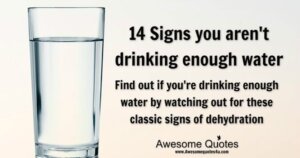Are YOU Drinking Enough Water?

Signs that You Need to Drink More Water
1. Your Mouth is Dry
This seems pretty obvious, but the ramifications might not be so. Of course, any time you feel that sticky, nasty feeling in your mouth, you’d obviously reach for some sort of liquid. But sugary drinks are only a temporary solution to a larger problem. Drinking water lubricates the mucus membranes in your mouth and throat, which will continue to keep your mouth moist with saliva long after that first sip.
2. Your Skin is Dry
Your skin is your body’s largest organ, so of course it needs to stay hydrated. In fact, dry skin is one of the earliest signs of full-on dehydration, which can lead to much larger problems. A lack of water means a lack of sweat, which leads to a body’s inability to wash away excess dirt and oil accumulated throughout the day. If you want to stave off breakouts, your first recourse should be to drink more water.
3. You’re Overly Thirsty
We went over dry mouth already, but thirst goes beyond a desert-like tongue. Anyone who’s ever had a hangover can tell you that, upon waking up, your body just can’t get enough water. Alcohol dehydrates the entire body, and drinking water sends “YES PLEASE!” signals to the brain until your fluid levels get back to baseline. Listen to what your body is telling you; it knows what it’s talking about!
4. Your Eyes Are Dry
By now it should be clear that drinking water affects more than just your mouth and throat. A lack of water intake leads to dry, bloodshot eyes (again, think of that last pounding hangover). Without water in the body, your tear ducts dry up. If you’re thinking “So what if I can’t cry?” realize that this could cause much more harm to your eyes, especially if you wear contacts on a daily basis.
5. You Experience Joint Pain
Our cartilage and spinal discs are made up of about 80% water. This is an absolute necessity to keep our bones from grinding against each other with every step we take. By keeping your body hydrated, you ensure that your joints can absorb the shock of sudden movements, such as running, jumping, or falling awkwardly.
6. Your Muscle Mass Decreases
Your muscles, also, are comprised mostly of water. Obviously, less water in the body means less muscle mass. Drinking water before, during, and after a workout not only keeps you hydrated and comfortable, it also brings water to the right places in your body, and decreases the chance of developing inflammation and soreness related to exercise and weightlifting.
7. You Stay Sick Longer
Drinking water allows your body to continuously flush out toxins. Your organs work to filter our certain waste products like a machine, but if you don’t fuel the machine with water, it cannot work properly. What ends up happening in a dehydrated body is organs start to pull water from stored areas like your blood, which leads to a whole new set of problems.
8. You Feel Fatigued and Lethargic
As we just mentioned, when a body is dehydrated it “borrows” water from your blood. A lack of properly hydrated blood leads to a lack of oxygen being brought throughout the body. Of course, a lack of oxygen leads to sleepiness and outright fatigue. A lack of stamina means you’ll start to experience that 2 PM crash earlier and earlier in your day (and remember, coffee won’t help in the long run).
9. You Experience Hunger Pangs
When you’re dehydrated, your body might start to think it needs some food. This happens throughout the day, and overnight when you wake up craving that midnight snack. However, eating food creates more work for your body, whereas drinking water purifies and your organs and supplies it with the fuel it needs to go through the other processes a body goes through.
10. You Experience Digestive Problems
We spoke before about the mucus in our mouth and throat, and how keeping hydrated allows the membrane to function correctly. This also applies to the entire digestive system. Without proper hydration, the amount and strength of mucus in the stomach lessens, allowing stomach acid to do some major damage to your insides. This leads to what we commonly refer to as heartburn and indigestion.
